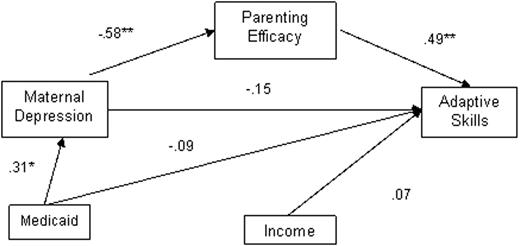Abstract
Abstract 1397
Poster Board I-419
Caregivers of children with sickle cell disease (SCD) have high levels of stress and depression. Students with SCD have a higher prevalence of behavioral and cognitive deficits compared to healthy students. Adaptive skills are particularly important for children with chronic disease because they are the skills needed to transition into independent adulthood. We hypothesize that (1) Maternal depressive symptoms are associated with decreased adaptive skills in children with SCD, and (2) This association will be mediated by the association between maternal depression and the provision of lower levels of competence promoting parenting.
We completed a cross-sectional analysis of a single center prospective cohort study. Adaptive skills of children with SCD were assessed by parent report of the Behavior Assessment System for Children (BASC). The BASC reflects the child's adaptive skills by 5 key adaptive scales: adaptability, activities of daily living, functional communication, social skills, and leadership. Maternal risk for depression was assessed using the Center for Epidemiologic Studies Depression Scale (CES-D). We completed structured interviews of the mothers to assess parenting quality. Effective parenting was characterized by high levels of support, involvement, monitoring, and low levels of ongoing conflict. A path analysis using ordinary least squares was used for statistical analysis.
48 children with SCD and their mothers were evaluated. 52% of the children were male; mean age was 12 yrs (Range 6-16). 25% of the children repeated a grade level in school. The mothers' mean age was 38 yrs (Range 27-59) and the average yearly household income per capita was $7,133 (Range 708- 22,800). 60% of the children received healthcare via Medicaid. 20% of the mothers were at risk for depression.12.5% of the children had clinically significant deficits in adaptive skills and18.8% of the children were considered “at risk.” There was a moderate correlation between maternal depression and child adaptive skills (r = .481, p=.01). A path analysis revealed that in the presence of parenting, the association between maternal depression and child adaptive skills is no longer significant. The effect of maternal depression is mediated by depression induced decrements in competence promoting parenting practices (Fig. 1). Medicaid was associated with higher maternal depressive symptoms.
Our preliminary data provide direct evidence that maternal depression is associated with proximal parenting practices that are associated with child adaptive skills. Parenting practices can be modified through education and family support and serve as a potential intervention target for moderating the effects of maternal depression on child adaptive skills in this vulnerable population.
Path analysis of maternal depression, parenting and child adaptive skills.
** P<.01,* P<.05 (two-tail);, CFI=.92, IFI=.93, n=48.
Path analysis of maternal depression, parenting and child adaptive skills.
** P<.01,* P<.05 (two-tail);, CFI=.92, IFI=.93, n=48.
Maternal depressive symptoms have a negative association with proximal parenting processes that are linked to adaptive skills in children with SCD. Stronger parenting indices are associated with better adaptive skills. In the presence of parenting, the direct association between maternal depression and adaptive skills is no longer significant.
Brody: NIH: Research Funding. White: NIH: Research Funding. King: NIH-NHLBI: Research Funding; Doris Duke Charitable Foundation: Research Funding.
Author notes
Asterisk with author names denotes non-ASH members.


This feature is available to Subscribers Only
Sign In or Create an Account Close Modal